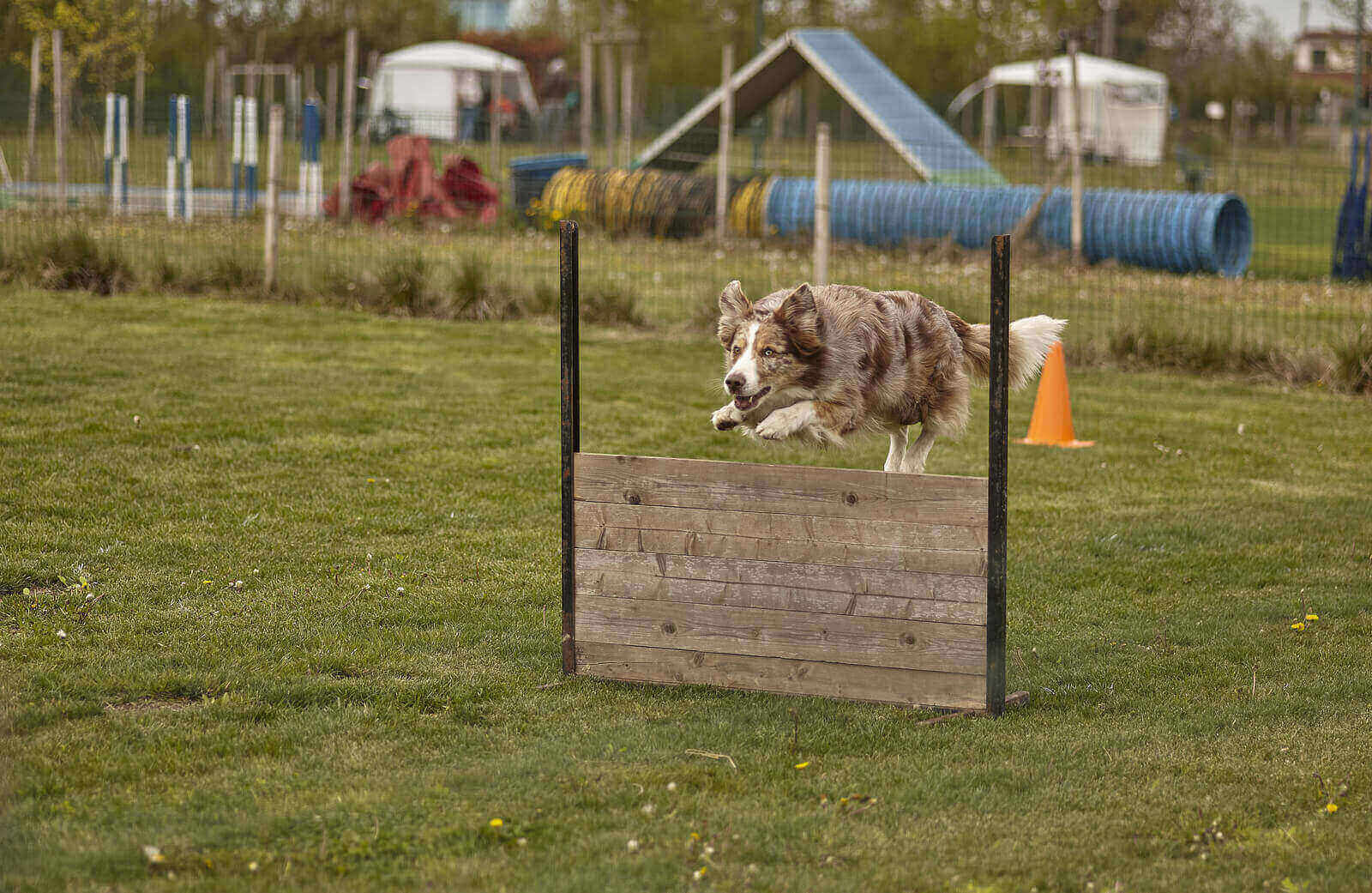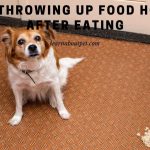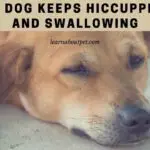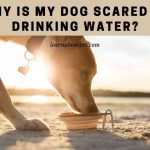It can be alarming to learn that your dog has eaten chalk. Once you learn that your dog has eaten chalk, you are likely to have many questions – including whether the chalk is toxic to dogs, what is likely to happen and what you need to do. This article explores those issues.
What happens if my dog ate chalk? Most types of chalk are nontoxic to dogs. Therefore nothing major is likely to happen, if a dog eats some little chalk. Sometimes, there may be minor stomach upset. But if a dog eats chalk containing lead, chokes on the chalk or gets intestinal obstruction from the chalk, then that can be serious.
Ultimately, what happens if dog ate chalk will depend on how much chalk the dog ate, as well as the type of chalk dog ate.
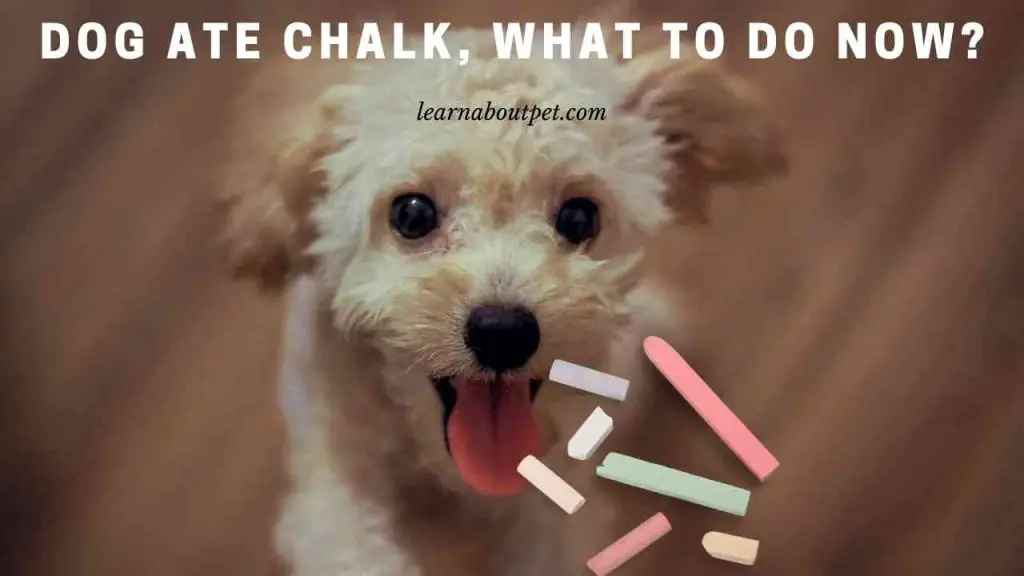
A case where a dog eats one single piece of chalk is entirely different from one where a dog eats a whole pack of chalk. In the latter case, there may be a great deal of stomach upset, with symptoms such as vomiting and unusual stools.
Similarly, a case where a dog eats chalk with nice rounded edges is likely to be very different from another one where a dog eats those pieces of chalk with rough edges. In the latter case, things like obstruction and choking would be more likely.
The age of the dog may also be relevant. If my puppy ate chalk, I would be more concerned than if an adult dog ate chalk.
All in all, cases of dogs eating chalk are common enough, and in the vast majority of them, there are no major complications.
Is Chalk Poisonous To Dogs?
Upon discovering that your dog has eaten chalk, the key worry you are likely to be having is on whether the chalk is poisonous to dogs.
So, is chalk poisonous to eat for dogs? Or, to put it differently, is chalk toxic to dogs?
The answer is that most types of chalk are not toxic to dogs. The keyword here is ‘most’. This means that most – but not all – types of chalk are nontoxic.
The few types of chalk that are potentially toxic to dogs include those that contain lead.
But indeed, most types of chalk are nontoxic to dogs.
Therefore if you learn that your dog has eaten chalk, you shouldn’t worry too much: at least with respect to toxicity.
But the fact that most types of chalk are nontoxic to dogs doesn’t mean that chalk is entirely ‘good’ for dogs.
True, most types of it may be nontoxic to dogs. But ingestion of chalk can still cause choking in some cases.
Where there is no choking, there may be incidences of chalk causing blockages further down the alimentary canal.
And the chalk dust may also cause respiratory issues. In fact, if my dog ate chalk powder, I would be more worried about the respiratory issues.
All in all, most types of chalk are not poisonous to dogs. But that doesn’t mean that dogs should be feeding on chalk routinely. There are other issues, besides toxicity, that can be problematic.
What Happens If My Dog Eats Chalk?
Once you learn that your dog has eaten chalk, you will probably have worries about what is likely to happen.
So the key concern here is, what if my dog eats chalk – what will happen?
The deeper worry may be along the lines of, can a dog get sick from eating chalk? Is chalk bad for dogs, and if so, to what extent?
In this situation, there may be great relief in knowing that most cases of dog chalk ingestion lead to no major complications.
Therefore if your dog accidentally ate chalk, nothing major may happen.
If something happens, it is more likely to be a stomach upset. This is common, whenever the dog eats something ‘new’. So you may see a bit of unusual stool, and perhaps vomiting in the worse cases.
Usually, if a dog ate some chalk, it will go right through the digestive system, and come out at the other end as stool.
If the dog ate colored chalk, it may be possible to see the color in the stool.
Where real complications arise, they may be in the form of choking or intestinal blockages.
If, for instance, my dog ate cube of pool chalk (with its rather odd cubical shape), this risk of choking would be higher.
Choking would also be a real worry if, for instance, my 3 month old puppy ate some of my daughters chalk. The internal pathways of such a puppy may be rather small: hence that higher risk.
In most cases though, where a dog eats chalk, nothing much happens.
And this applies even if the dog ate ant chalk or if the dog ate climbing chalk. Even if the dog ate chalk pastel or the dog ate chalk paint, there may be no major issues.
Why Would A Dog Eat Chalk?
In most cases, a dog eats chalk due to curiosity.
There are a few cases where a dog eating chalk is due to boredom.
And in even rarer cases, a dog eating chalk may be due to a condition we refer to as pica, which causes dogs to ingest all manner of non-food items.
Thus if, for instance, you are trying to figure out why does my dog ate sidewalk chalk, these may be the possible reasons.
My Dog Ate Chalk – What Should I Expect?
If your dog ate just a little chalk, nothing much may happen. The chalk may travel down the dog’s alimentary canal, and come out of the other end as poop.
So if the chalk was of the more colorful variety, you may expect more colorful poop…
Thus if, for instance, my dog ate chalk paint, this would be something to expect.
If your dog ate much chalk, it may experience stomach upset. Therefore the dog may have symptoms like unusual stools and vomiting. These will likely be transient.
In case the dog is unlucky, the chalk may cause choking or intestinal blockage. If my dog just ate chalk, those would be the more worrisome possibilities. But thankfully, they are quite rare.
My Dog Ate Sidewalk Chalk – Will He Be Alright?
If you realize that your dog has eaten sidewalk chalk, the core concern is likely to be with regard to toxicity.
So you may wonder, is sidewalk chalk poisonous to dogs? That is because poisoning is the biggest concern here.
Indeed, is sidewalk chalk toxic to dogs? The answer is that, in most cases, sidewalk chalk is not toxic to dogs.
Remember, the people who design sidewalk chalk usually design it for use by kids. They therefore endeavor to make it nontoxic.
But there have been reports of some brands containing lead.
Ultimately though, if the dog has eaten sidewalk chalk, chances are that he will be alright.
There may be some slight stomach upset, but that is just about it.

You may then ask, I think my dog ate sidewalk chalk, what should I do? (Or to put it differently, my dog ate sidewalk chalk what do I do to help)?
And the answer is that you should just keep a close watch on the dog.
If the stomach upset arising from the dog eating sidewalk chalk worsens, then you can take remedial actions.
Or if there is choking or intestinal obstruction, consult a vet urgently.
My Dog Ate Pool Chalk – What Is Likely To Happen?
In most cases, the pool chalk will not cause major problems in a dog. That is unless it is of one of those varieties that contain lead. Then it can be toxic.
But if it is lead-free pool chalk, you need not worry. At worst, the dog may have a transient stomach upset.
My Dog Ate Blackboard Chalk – Should I Worry?
Normally, blackboard chalk comes in somewhat long cylindrical forms. These can cause choking or intestinal blockages. So you may worry about these.
These would also be the things to worry about, if my dog ate a chalk marker.
But if the chalk somehow goes through the dog’s digestive system and emerges at the other end as poop, there would be no more worry.
My Dog Ate Hair Chalk – What Are The Risks?
The first risk is that of the chalk causing stomach upset in the dog.
Another risk is that of the dog choking on the chalk while eating it.
Yet another risk is that of the dog ending up with intestinal obstruction due to eating the chalk.
These risks are not unique to hair chalk though. They would still be the applicable risks if the dog ate gym chalk or if the dog ate kids chalk, if the dog ate crayola chalk and so on.
Thankfully, these things usually don’t come to pass. In most cases where dogs eat hair chalk, no major problems manifest.
Still regarding hair chalk, its usage is controversial in some quarters. That leads to questions like this: is chalk bad for dogs fur? And the answer is that there are some experts who think that it is indeed bad for dog’s fur.
But in the case of a dog eating the hair chalk, that would be an extraneous consideration.
The key concern would be on whether hair chalk will, for instance, be toxic to the dog. And in most cases, it isn’t.
My Dog Ate Chalk Is That Bad?
If I think my dog ate chalk, my deepest worry would – understandably—be on whether this situation (of dog eating chalk) is bad.
In other words, what if my dog ate chalk? Will chalk make my dog sick?
The true position is that, in most cases, eating chalk won’t make a dog very sick.
If it does make a dog sick, what you will likely see is a minor transient stomach upset. That is unless it is a case of a dog eating a truly great amount of chalk.
In the latter case, even when you take a photo of the dog, it may give the impression that the dog is truly unwell. So one may think (in jest of course) that the dog photo ate chalk itself!
In the final analysis though, we do have to mention that a dog shouldn’t eat chalk. Chalk is not dog food.
So the reassurances we are giving are for instances of dogs eating chalk accidentally.
Chalk may not be ‘bad’ for dogs in the sense of it being toxic. But its consumption still brings about the risk of stomach upsets, choking hazards and potential for internal obstructions.
Therefore if your dog has eaten chalk, you need to treat it as a ‘bad’ thing. Then take steps to prevent it from happening again.
My Dog Ate Chalk – What Do I Do?
After learning that your dog has eaten chalk, the key concern is on the way forward. That is what leads to this question: my dog ate chalk what should I do?
Now what to do if my dog ate chalk depends on the amount of chalk eaten, and the type of chalk eaten.
If a dog eats a great amount of chalk, there may be stomach upset. So it may be good to expect that. And if it worsens, it may be a good idea to take the dog to the vet.
Otherwise if the stomach upset is minor, you may take the dog off food for some while. But continue supplying water. The goal here is to get the digestive system to get the chalk out as fast as possible…
With regard to the type of chalk, if it is in an odd shape (like cube chalk), watch out for signs of choking or obstructions.
If there is choking or obstruction, take the dog to the vet right away. (For choking, you may first need to try first aid, like dislodging the chalk if you can do so safely).
If the chalk is of the type that contains lead, then you will be dealing with major toxicity. So it would be ideal to consult a vet right away.
Final Verdict – Dog Ate Chalk
Most types of chalk are nontoxic to dogs. But there are a few that contain elements like lead, which can be harmful to dogs.
In most cases, if a dog eats chalk, nothing much may happen. The chalk goes through the digestive system, and comes out at the other end as poop.

But if it is a great amount of chalk, there may be some stomach upset. Some chalks might even contain lead and can create much more harm to pet dog’s health.
The greatest worry with regard to dogs eating chalk is in that it may cause choking or intestinal blockages.
If a dog eats chalk, what you need to do is keep a close eye on it. If there are major issues – like those arising from choking, intestinal obstructions or lead toxicity, consult a vet urgently. Otherwise just let the dog be.
As a pet lover, make sure to learn about pet more and give your pet dog a good and comfortable life!

Welcome to Learn About Pet. My name is Rajkumar Ravichandran and I love all pets, travel, and amazing food. I write about my passion and personal experience caring for multiple pets in this blog! ❤️
Post Disclaimer
DISCLAIMER: THIS BLOG OR WEBSITE, "Learn About Pet", DOES NOT PROVIDE YOU WITH MEDICAL ADVICE AND IS NOT A SUBSTITUTE FOR MEDICAL ADVICE. ALWAYS GET IN TOUCH WITH YOUR PERSONAL VETERINARIAN AND USE INFORMATION HERE AS GENERAL ADVICE.
The information, including but not limited to, text, graphics, images and other material contained on this website are for informational purposes only. No material on this site is intended to be a substitute for professional veterinary advice, food recommendation, diagnosis, or treatment. Always seek the advice of your veterinarian or other qualified health care provider with any questions you may have regarding a medical condition or for pet food related questions.

